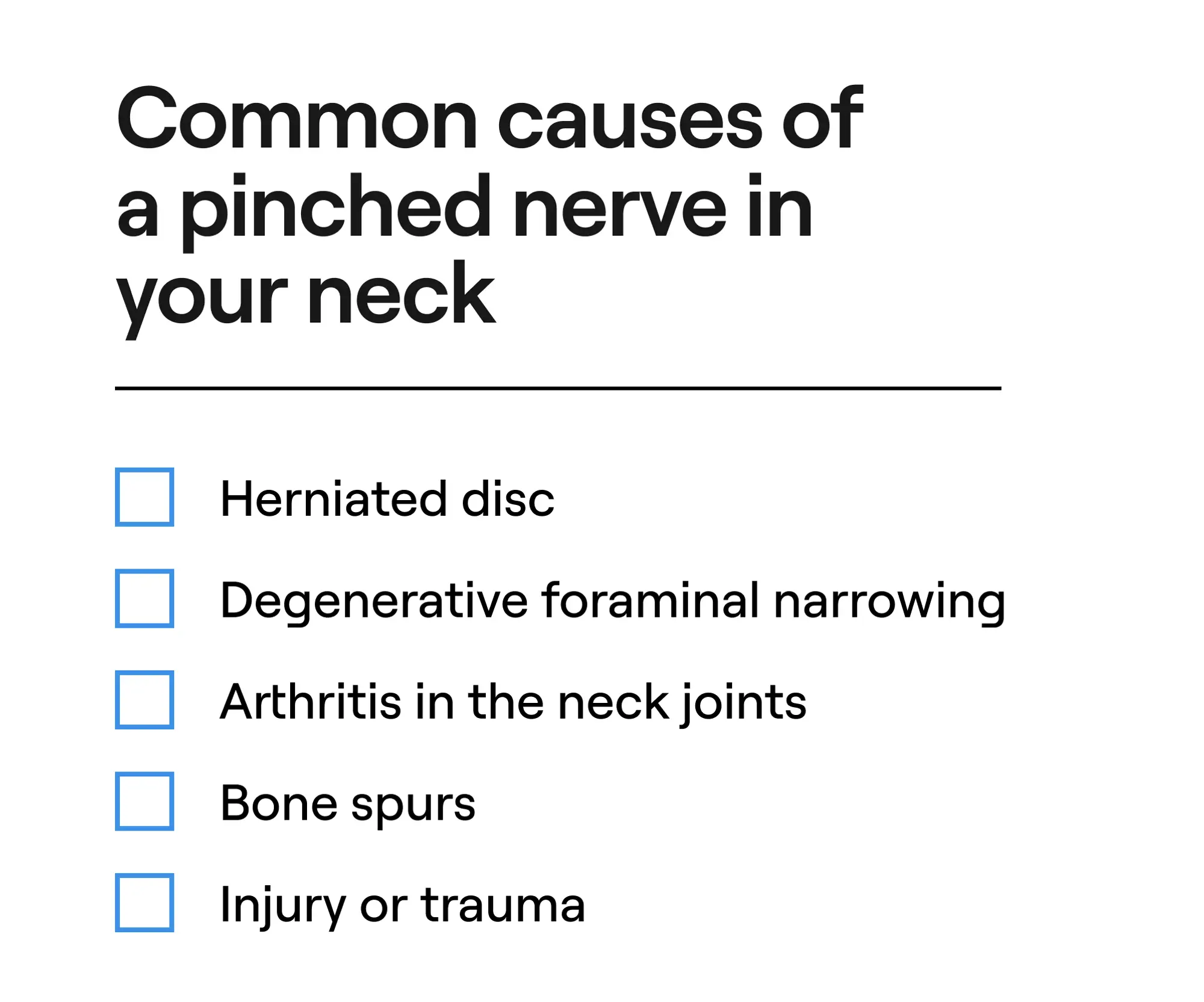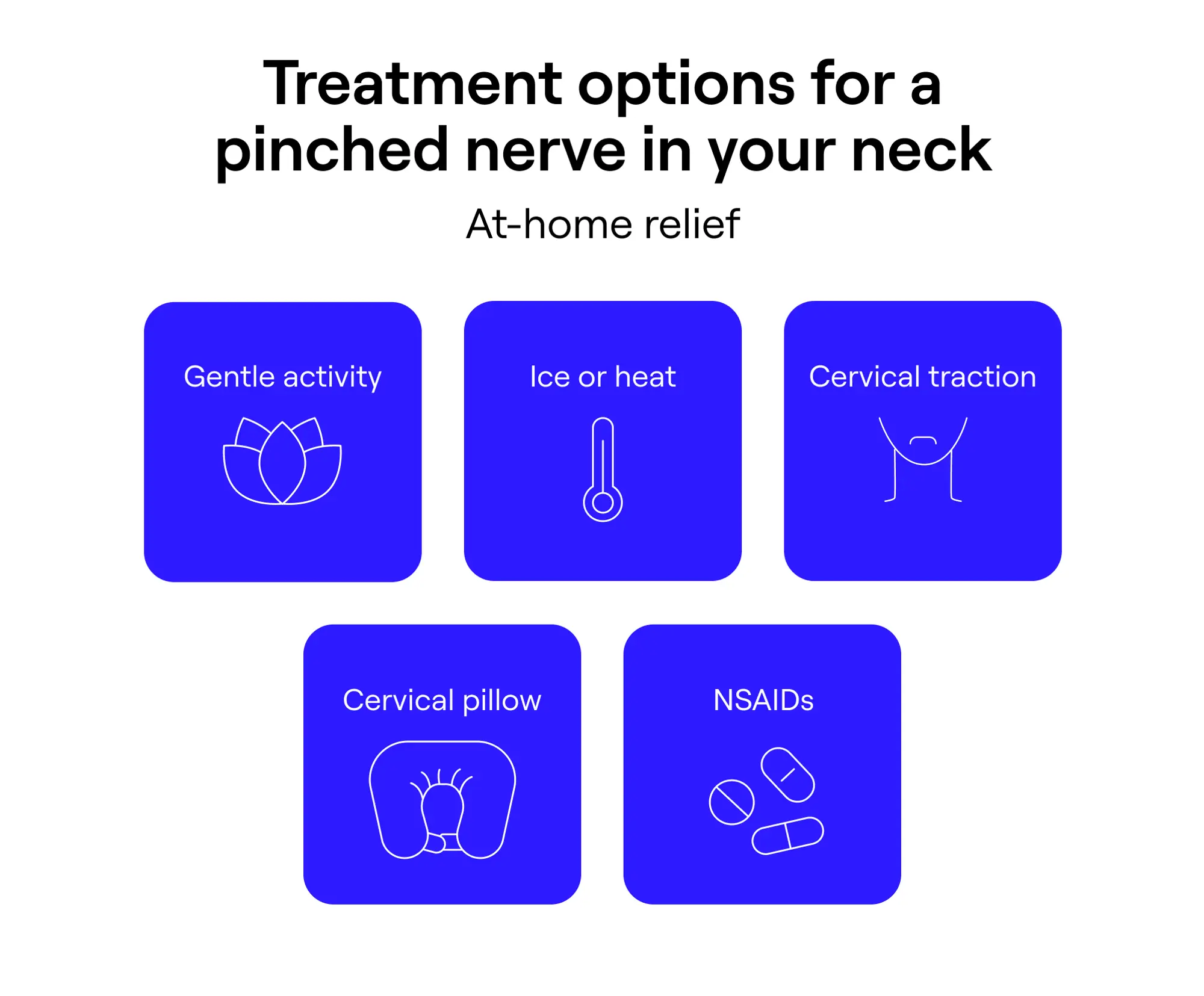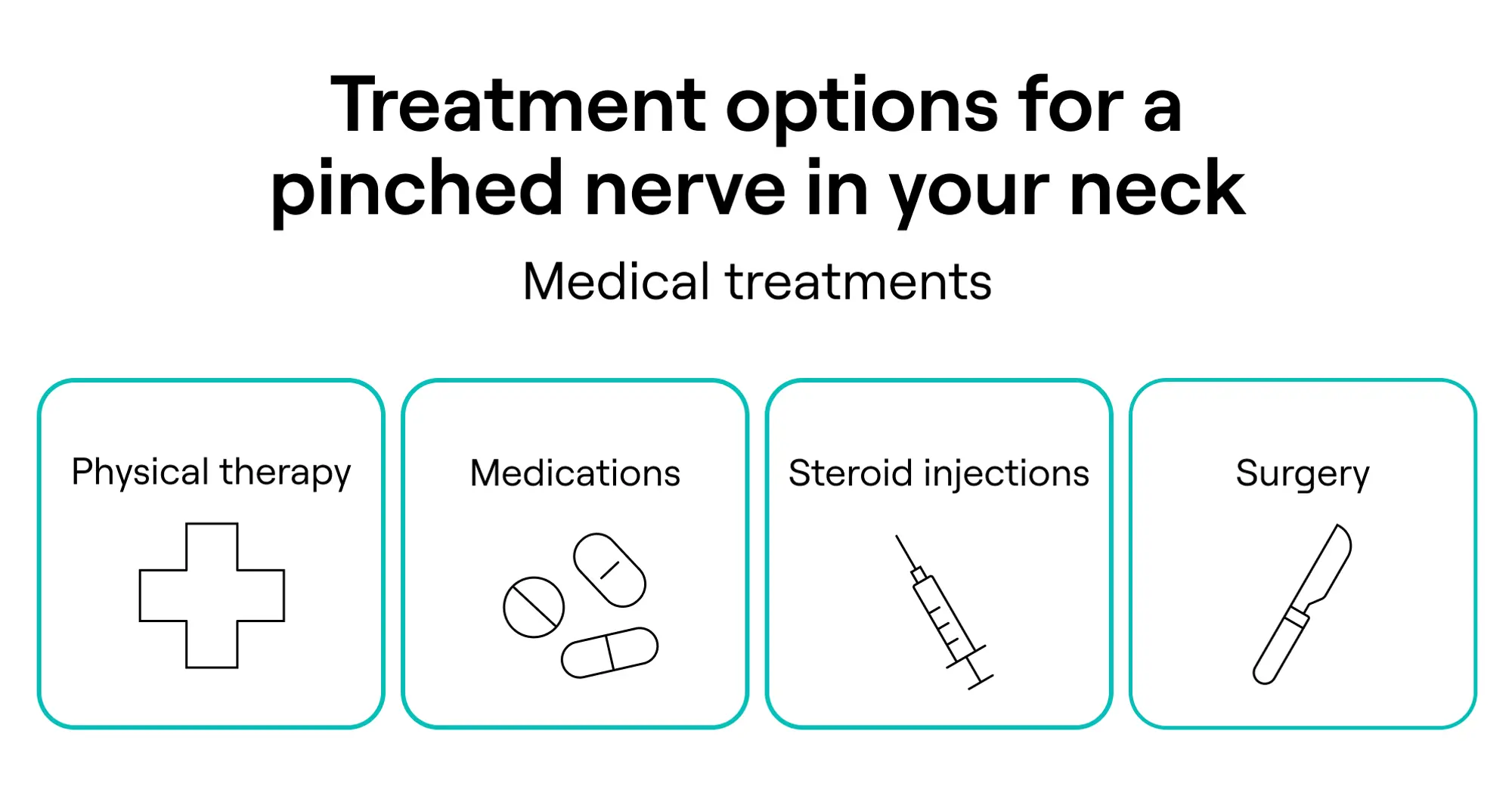
Jump to
Book a visit
$25 typical copay
$100 without insurance
Get a legitimate doctor's note online today for work or school.
A pinched nerve in your neck, aka cervical radiculopathy, occurs when your nerve roots become compressed. As you can imagine, it’s anything but fun: You might feel muscle weakness, radiating pain, or have difficulty turning your head. Many cases resolve on their own, but sometimes medical treatment is necessary.
Every so often, while having coffee in the morning, either my husband or I will say, “I slept funny, and now I can’t turn my head!” And the other one will be stuck doing grocery pickup due to their coveted ability to actually look in the side-view mirror today. Sometimes, getting a pinched nerve in your neck just happens.
Although common, a “crick” in your neck can be extremely frustrating, as it can impact your ability to do everyday activities, such as working, driving (hello, checking that blind spot!), exercising, completing household chores, and more. Did you know that up to 40% of work absenteeism occurs in people with neck pain? Makes sense.
Typically the solution, for me, involves taking a nonsteroidal anti-inflammatory drug (NSAID), such as ibuprofen and then waiting it out while going about my day as best I can. Usually the discomfort resolves and mobility returns. But in the short term, a pinched nerve can feel like something is horribly wrong, with stiffness, searing pain or aching, and limited ability to move.Of course, sometimes the pain from a pinched nerve persists and requires medical intervention. The treatment that is best for you will depend on the underlying cause of the nerve compression and your medical history.
In this article, we explore what a pinched nerve is, pinched nerve symptoms, cervical radiculopathy treatment, and more.
What is a pinched nerve?
“Cervical radiculopathy is compression of a cervical nerve root,” says Pallabi Sanyal-Dey, MD, the medical director for General Medicine. This causes pain, mobility issues, and more.
Spinal anatomy lesson incoming! Your neck contains your cervical spine, which contains seven bones, specifically the C1-C7 vertebrae. These vertebrae protect your spinal cord, almost like a little cage. Round discs between each vertebrae provide cushioning, with each disc comprising a firm outer layer with a gel-like center (called the nucleus pulposus, if you were wondering). Each vertebrae features an opening called the vertebral foramen.
Together, the vertebral foramina stack up to form the vertebral canal, which holds and protects your spinal cord, running from the base of your brain down to your tailbone. The spinal cord serves as the communication highway between your brain and all parts of your body via 31 pairs of spinal nerves—that’s a lotta nerve!
A nerve root is the initial nerve segment that exits your spinal cord to send signals to other body parts. It emerges at the spinal column through the intervertebral foramen, a small paired opening between vertebrae. Each nerve supplies a dermatome, or skin region, and damage to a particular nerve can cause symptoms for its corresponding dermatome.
So in the case of a pinched nerve in the neck, you may feel pain right at the site, or it may radiate into your shoulder and even down your arm.
Common causes of a pinched nerve in your neck
Dr. Sanyal-Dey says, “Degenerative foraminal narrowing or an acute cervical disc herniation are the leading culprits.” Degenerative what? We’ll explain. Here are some of the common causes of the dreaded cervical radiculopathy:
- Herniated disc: A herniated disc occurs when the gel-like center of a disc bulges from damage to the disc’s outer layer. This bulging can press on a nerve root, causing pain.
- Degenerative foraminal narrowing: As you age, you may experience degenerative (wear and tear) changes to your spine. The bony openings (foramina, a pretty name for a spiky spot), through which nerve roots pass through to the dermatome, can narrow and compress the nerve.
- Arthritis in the neck joints: Arthritis can inflame your vertebrae, leading to swelling, which can also compress nerves.
- Bone spurs: Cervical osteophytes are bone spurs, abnormal bony protrusions, that occur in your neck. They can compress nerves, leading to pain and mobility issues.
- Injury or trauma: Neck injury or trauma can cause inflammation that can compress a nerve.

Common causes of a pinched nerve
Recognizing pinched nerve symptoms
“Unilateral neck-to-arm sharp pain with dermatomal numbness, paresthesia, and focal motor weakness signals a pinched cervical nerve,” Dr. Sanyal-Dey says. Here’s what that means.
Symptoms of cervical radiculopathy include:
- Pain in the neck, and potentially pain in the affected shoulder or arm
- Stiffness
- Muscle spasms
- Focal motor weakness (weakness in a specific area)
- Difficulty turning your head or using the affected arm or shoulder
- Paresthesia: numbness, tingling, burning, or electrical shock sensation
How is cervical radiculopathy diagnosed?
To get to the bottom of your potential pinched nerve, a health care provider will “combine your symptom story (neck pain that may shoot into the arm, numbness/tingling, weakness) with a hands-on neuro exam of strength, sensation, and reflexes,” says Marjory Bravard, MD, a physician with General Medicine.
“They may gently position or press” around your affected area to determine what’s up, continues Dr. Bravard. That can include, for example, tilting or pressing your head, placing your hand on top of your head to see if your symptoms ease then, and/or lightly stretching your arm nerves to check whether your arm symptoms switch on, she explains. “Imaging, such as MRI, is added when symptoms are severe, persistent, or show red flags,” Dr. Bravard notes.
In some cases, you may need a nerve conduction study. This test uses electrodes placed on your skin that help measure how fast and how well signals travel in your body.
Treatment options for a pinched nerve in your neck
If you’re wondering how to treat cervical radiculopathy, here’s the good news: Over 85% of acute cases will resolve on their own within 6-12 weeks, especially with at-home care. But if your pain or mobility issues persist beyond a few days, some medical treatments may also help.

At-home relief for a pinched nerve in your neck
At-home relief
- Gentle activity: “Don’t park yourself in bed,” Dr. Bravard says. Gentle movements can help reduce stiffness, reduce inflammation, and aid with healing. So, go for a walk or consider gentle restorative yoga. A provider can also teach you gentle stretches that can help ease stiffness and aid with mobility.
- Ice or heat: “Short, protected ice can help calm sharp flares,” she says, “while heat often feels better later for muscle tightness—so use whichever gives relief.” Use an icepack wrapped in a towel or cloth to protect your skin. But don’t go too hard here; remove either the ice or heat after 20 minutes.
- Cervical traction: “Consider home cervical traction only after a professional shows you how,” she adds. You can learn how via an in-person or telehealth appointment.
- Cervical pillow: Using a cervical pillow may reduce your risk of worsening the pinched nerve while you sleep.
- NSAIDs: An over-the-counter NSAID, such as ibuprofen, can help ease inflammation and swelling to reduce compression on your nerve. Just be sure NSAIDs are safe for you; some people have an allergy to them, while others may be on medications that interact with NSAIDs or have underlying conditions that require avoiding these medications (or using only under the close guidance of a clinician).
Medical treatments
These are all quite rare when it comes to pinched-nerve treatments, but they can be helpful or even necessary for more extreme cases.

Medical treatments for a pinched nerve in your neck
- Physical therapy: Physical therapy can help with traction and manual care and provide strengthening, stretching, and postural alignment.
- Medications: In some cases, your doctor may prescribe a course of prescription NSAIDs or even a medication that reduces nerve pain, such as gabapentin. A short (7-10-day) tapering course of oral corticosteroids may be offered to select patients.
- Steroid injections: “Epidural steroid injections can be considered if arm pain persists,” Dr. Bravard says. Research indicates that even just one treatment may provide significant relief and may accelerate healing and the return to normal mobility.
- Surgery: Surgery is generally a rare last resort that’s “reserved for progressive weakness or stubborn pain that matches imaging findings after conservative treatment,” Dr. Bravard says. Surgery options include anterior cervical discectomy and fusion (ACDF), cervical disc replacement, or posterior foraminotomy.
What not to do for a pinched nerve in your neck
We’ve covered what to do, but you may be wondering about any no-nos.
What to avoid:
- Poor posture: We’re all prone to staring down or bending our necks forward to view our phones. That’s just one example where we can slack off on our posture. Just be mindful of how you position yourself so as to avoid worsening the issue.
- Heavy lifting: Now is not the time to, say, help your friend move a sofa or piano—really, is it ever? But heavy lifting can place excess pressure on your neck, causing more pain or injury.
- Sleeping on your stomach: Be careful not to repeat any movements or positions that may have been the culprit of your neck woes. For example, if you slept on your stomach with your neck craned to to the side (whoops!), avoid that position going forward if possible.
- Sudden neck movements: Now is also not the time to attend a tennis match, whipping your neck back and forth. Again, this is just one example, but sudden movements can cause more pain and inflammation.
- Repetitive neck movements: While gentle movement is good, avoid anything requiring a repetitive motion, such as swimming and having to turn your neck to breath. If you are an avid swimmer, this does not mean you can never hit the pool again, just that you might need to avoid freestyle for a few days until the inflammation resolves.
- Resting for prolonged periods in bed: As Dr. Bravard says, avoid just staying in bed or resting. Gentle movements help facilitate healing and pain relief. For example, when I have a pinched nerve, I’ll skip my trail run or weight lifting, but I’ll still get in some walking, stretching, or chill indoor cycling.
When to seek medical attention
If your pain, stiffness, or other symptoms do not improve within a few days, consult a doctor for an evaluation. Seek immediate medical attention if you experience the following in conjunction with a suspected pinched nerve, Dr. Bravard says:
- New weakness
- Bowel or bladder changes
- Fever
- Neck injury
Preventing a pinched nerve in the future
Prevention techniques won’t guarantee that you’ll be pinched-nerve free, but they can reduce your risk for reoccurrence. And hey, maybe they’ll even increase your likelihood of successfully driving after a night of “sleeping funny.”
- Complete physical therapy: A physical therapist can teach you strengthening, mobility, flexibility, and postural alignment techniques that can help.
- Consider ergonomics: Ergonomics is the science of designing and arranging items for use in ways that are efficient and safe. For example, some pillows are designed to keep your neck supported and in alignment while you sleep, and some desk chairs are designed to support your spine while you work. A provider can help you with ergonomic training for your unique circumstances.
- Stay active: Exercise helps keep inflammation in check. So find activities that you love that help you live an active lifestyle.
Key takeaways
- Cervical radiculopathy means you have a pinched nerve in your neck.
- Common causes include a herniated disk, degenerative spinal changes, arthritis, bone spurs, and more.
- Treatment generally involves conservative options you can try at home, but if pain persists, consult a provider.
- General Medicine can offer a telehealth consultation to provide you with next steps.
FAQ
How do you fix a pinched nerve in your neck?
If you have a pinched nerve in your neck (cervical radiculopathy), at-home remedies may help, such as gentle activity, using ice or heat on the affected area, taking an over-the-counter non-steroidal anti-inflammatory drug (NSAID), and more. If your pain does not resolve within a few days, consult a clinician. Seek immediate medical attention if you’ve experienced an injury or have noticed fever, bowel or bladder changes, or a new sensation of weakness.
How can you tell if you have a pinched nerve in your neck?
The only way to tell for sure if you have a pinched nerve in your neck is to seek evaluation with a medical professional. However, common symptoms include pain in the neck that may radiate to your arm and shoulder, stiffness, muscle spasms or weakness, difficulty turning your head to the side or using the affected arm and shoulder, headache, and paresthesia, such as numbness, tingling, burning, or an electrical shock sensation.
What can be mistaken for a pinched nerve in the neck?
Sometimes other conditions can be mistaken for a pinched nerve in the neck, including rotator cuff injuries, thoracic outlet syndrome, muscle spasms, peripheral neuropathy, and even delayed onset muscle soreness from physical exertion.
Can you massage out a pinched nerve in your neck?
Massage therapy may help relieve discomfort from a pinched nerve, depending on the underlying cause of the issue. Consult with a healthcare provider for the best treatment recommendation for your unique situation.
What stops nerve pain immediately?
No remedy exists to stop nerve pain immediately. However, some over-the-counter medications, such as nonsteroidal anti-inflammatory drugs (NSAIDs), might help relieve pain if they are safe for you to take. Additionally, your care provider may prescribe oral medications, injections, or other therapies to ease your discomfort.
Our editorial standards
At General Medicine, we cut through the clutter to make health care clearer, faster, and easier to navigate. Every article is grounded in evidence-based research and peer-reviewed journals, reviewed by medical professionals, and written in accessible language that helps you make health decisions with confidence. We’re committed to ensuring the quality and trustworthiness of our content and editorial process by providing information that is up-to-date, accurate, and actually useful. For more details on our editorial process, see here.



